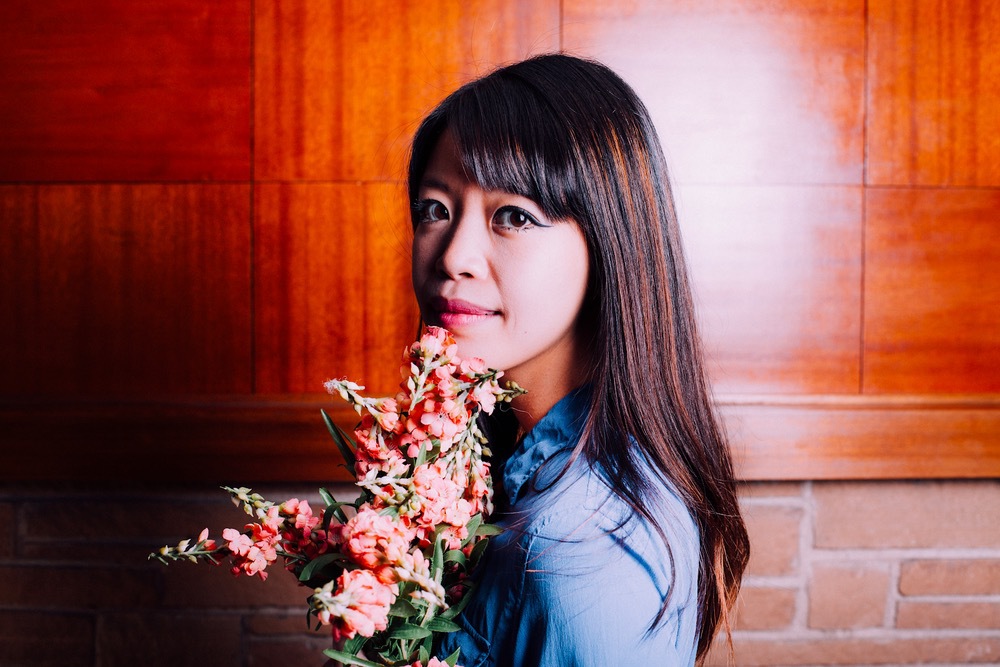
As part of the Fall ’22 Reading Series organized by the English department, poet Jane Wong spoke at Frank Manor House on Nov. 8. She read poems from her newest book, “How to Not Be Afraid of Everything,” interspersed with unscripted talk about their meaning and her process.
“How to Not Be Afraid of Everything” speaks on Wong’s ancestors, Chinese-American heritage and upbringing in a restaurant on the Jersey Shore. It is overarchingly a response to finding out about her ancestors’ deaths during the Great Leap Forward — a movement by the Chinese Communist Party that led to mass starvation in an attempt to promote economic growth.
Despite her heritage, she didn’t learn about the Great Leap until college, when a professor offhandedly mentioned the initiative and its death toll during a lecture. She thought back to her grandpa talking about his family members “disappearing,” and suddenly realized that this truth had been covered up and kept from her.
Thus began the long journey for Wong of grappling with the erasure of her family history, which she finally, more than 10 years after that lecture, feels ready to share in this book. The poems in Wong’s book are raw, visceral and deeply personal.
“‘How to Not Be Afraid of Everything’ does not give you any advice, unfortunately, about how to get rid of your fears. In fact, there’s a lot of fear and anger in this book,” she explained. The book opens with an outburst of these emotions, which she describes as a kind of catharsis– an expression of feelings she has been taught to repress.
She goes on to develop themes of healing and reconnecting with her ancestors, as she seeks to honor them through her life and art. Through this book, Wong came to a realization that “my ghosts and my ancestors, they have my back. There is this sense of (being) comforted by the generations that have come before me.”
Food is a prominent theme in Wong’s work: Growing up in a restaurant, she was surrounded by food– a life of indulgence in stark contrast with her ancestors who lacked the basic sustenance for survival. Her deep connection with and appreciation of food as a nourishment of life, culture and spirituality runs through her writing.
The last poem in the book, “After Preparing the Altar, the Ghosts Feast Feverishly,” Jane describes as “co-written with my ghosts.” She described to the audience having an out-of-the-blue vision of her ancestors imploring her to write down their message. Believing that this was her ancestors’ way of speaking through her, she published the poem exactly as it appeared to her, having edited nothing but the form. Receiving a response from her ancestors, she said, felt like a culmination of her work over the years to understand and connect with her past. It was after this experience that the idea for “How to Not Be Afraid of Everything” was born.
She acknowledged that the book will be marketed as an “immigrant baby” narrative, a category that has become popular in the publishing industry over the last few years. However, she wanted the book to present a complete narrative of all aspects of her identity and journey, not just those that fit into a marketable and digestible story.
Her first literary agent told her to cut all the poems about romantic relationships and leave only the ones about her Chinese heritage. She decided to fire him and keep the poems rather than sacrifice her authenticity. She said she does not want to be reduced to her heritage, or seen as just a success story. Rather, she wanted the book to represent herself as a whole, including the long, fraught process of getting to where she is today, including “messy breakups and terrible ex-boyfriends.”
Since the COVID-19 pandemic, Wong has been experimenting with novel ways to present her work. She recently exhibited one of her poems in an art installation, where she glued the words in circles inside metal bowls and lit the room “intestinal pink.” She has also been exploring how to incorporate food, such as baking poems into dumplings and literally eating her words.
Wong also read an excerpt from her memoir, “Meet Me Tonight in Atlantic City,” which comes out in May 2023. This will be her first published work of prose, though her visceral sensory lyricism still runs through it, lending it an enchanting flow of hyper-reality and painfully honest emotion mixed with charming, dry wit.
She invited questions from attendees, one of whom asked how she avoided “being cheesy” when covering topics around which so many recognizable cliches have formed, such as race. Wong responded that she just wants to be authentic, and aims to be as emotionally true as possible to communicate her experience, even if that means using cliches.
Subscribe to the Mossy Log Newsletter
Stay up to date with the goings-on at Lewis & Clark! Get the top stories or your favorite section delivered to your inbox whenever we release a new issue.

Leave a Reply